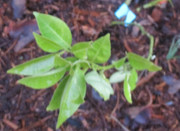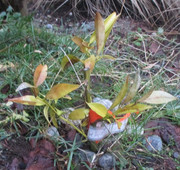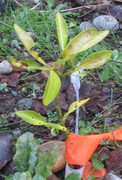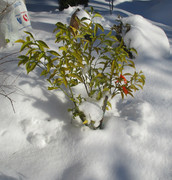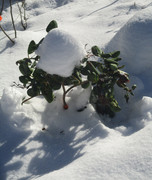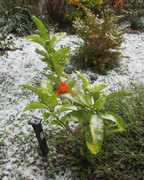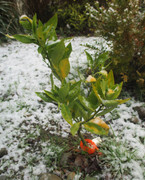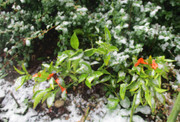76
Cold Hardy Citrus / Re: Cold hardy lemons
« on: February 13, 2022, 09:01:25 PM »
The true lemon flavor comes from the original citrus species citron. But I think a little bit of the fragrance of lemon also comes from pomelo as well. The juiciness of lemon does not come (or barely comes) from citron, but rather pomelo and/or mandarin. The proportion of mandarin cannot be too high otherwise the flavor will be too "orange" rather than distinct lemon.
Ichang papeda has a flavor that is half similar to citron, it does not have the "orange" component. (Actually I would describe it as half citron and half Kaffir lime) But the flavor of Ichang papeda is still a little bit inferior to citron, I would say. So to develop a high quality hardy lemon, I think perhaps citron should be bred into there. Unfortunately citron has very little hardiness.
I have had the opportunity to taste citron, both Ichang papeda and Yuzu picked fresh off the tree. And of course I have tasted pomelo. (I have not actually had the opportunity to taste Ichang lemon though)
You could of course try crossing a regular lemon with something else, but my thought was that if you began with a citron rather than a lemon, the resulting hybrid would retain a more distinctive citron/lemon flavor, since the citron ancestry has not been diluted as much.
A direct cross between a lemon and anything else that is really lemon-like, probably is not going to be cold tolerant enough. I think at least two subsequent hybridizations will be required.
Ichang papeda has a flavor that is half similar to citron, it does not have the "orange" component. (Actually I would describe it as half citron and half Kaffir lime) But the flavor of Ichang papeda is still a little bit inferior to citron, I would say. So to develop a high quality hardy lemon, I think perhaps citron should be bred into there. Unfortunately citron has very little hardiness.
I have had the opportunity to taste citron, both Ichang papeda and Yuzu picked fresh off the tree. And of course I have tasted pomelo. (I have not actually had the opportunity to taste Ichang lemon though)
You could of course try crossing a regular lemon with something else, but my thought was that if you began with a citron rather than a lemon, the resulting hybrid would retain a more distinctive citron/lemon flavor, since the citron ancestry has not been diluted as much.
A direct cross between a lemon and anything else that is really lemon-like, probably is not going to be cold tolerant enough. I think at least two subsequent hybridizations will be required.

